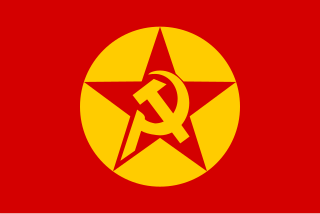
The Revolutionary People's Liberation Party/Front is a Marxist–Leninist communist party in Turkey. It was founded in 1978 as Revolutionary Left, and has been involved in a militant campaign against the Republic of Turkey since the 1980s. It was renamed in 1994 after factional infighting. It is classified as a terrorist group by Japan, Turkey, the United States, the United Kingdom and the European Union.

The Republic of Turkey (Türkiye) and the United States of America established diplomatic relations in 1927. Relations after World War II evolved from the Second Cairo Conference in December 1943 and Turkey's entrance into World War II on the side of the Allies in February 1945. Later that year, Turkey became a charter member of the United Nations. Since 1945, both countries advanced ties under liberal international order, put forward by the US, through a set of global, rule-based, structured relationships based on political, and economic liberalism. As a consequence relationships advanced under G20, OECD, Council of Europe, OSCE, WTO, the Euro-Atlantic Partnership Council, IMF, the World Bank and the Turkey in NATO.

Sheridan Circle is a traffic circle and park in the Sheridan-Kalorama neighborhood of Washington, D.C. The traffic circle, one of two in the neighborhood, is the intersection of 23rd Street NW, Massachusetts Avenue NW, and R Street NW. The buildings along this stretch of Massachusetts Avenue NW are part of Embassy Row, which runs from Scott Circle to Observatory Circle. Sheridan Circle is a contributing property to the Massachusetts Avenue Historic District and the Sheridan-Kalorama Historic District, both listed on the National Register of Historic Places (NRHP). In addition, the equestrian statue of General Philip Sheridan is 1 of 18 Civil War Monuments in Washington, D.C., that were collectively listed on the NRHP.

The State of Israel and the Republic of Turkey formally established diplomatic relations in March 1949. Less than a year after the Israeli Declaration of Independence, Turkey recognized Israeli sovereignty, making it the world's first Muslim-majority country to do so. Both countries gave high priority to bilateral cooperation in the areas of diplomacy and military/strategic ties, while sharing concerns with respect to the regional instabilities in the Middle East. In recent decades, particularly under Turkey's Erdoğan administration, the two countries' relationship with each other has deteriorated considerably. However, diplomatic ties were reinstated after a normalization initiative in mid-2022. Relations soured again after the 2023 Hamas-led attack on Israel, Turkey condeming Israel and condoning Hamas.

Iran–Turkey relations are the bilateral relations between the Islamic Republic of Iran and the Republic of Turkey. The two states' relationship is complex and characterized by periods of both tension and cooperation, as both Iran and Turkey are fighting for influence in the Middle East through supporting opposing proxies as part of a proxy conflict. The two countries are also major trade partners and are perceived as mutually interdependent due to geographical proximity as well as historically shared cultural, linguistic, and ethnic traits.
Halkbank is a Turkish bank, first incorporated in 1933 as a state-owned bank. After growing throughout much of the twentieth century, it began absorbing smaller-sized state banks around the turn of the millennium. Halkbank is now a publicly traded company, although the majority stakeholder remains the Turkish government. Halkbank is a bank that offers vehicle loans, housing loans, consumer loans and commercial loans. A number of scandals and controversies involving the bank emerged in the 2010s, some of which culminated in arrests of its executives.
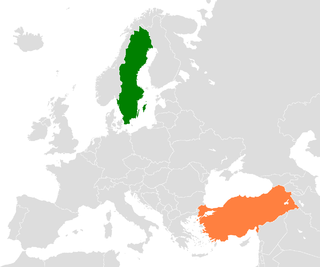
Swedish–Turkish relations are foreign relations between Sweden and Turkey. Both countries are full members of the Council of Europe, NATO, the Organisation for Economic Co-operation and Development (OECD), the Organization for Security and Co-operation in Europe (OSCE) and the Union for the Mediterranean.
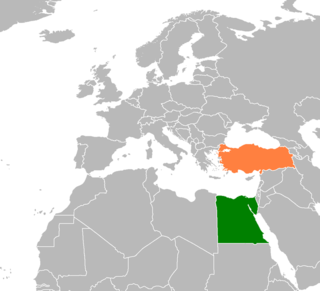
Egypt and Turkey are bound by strong religious, cultural and historical ties, but diplomatic ties between the two have remained extremely friendly at times and extremely strained at others. For three centuries, Egypt was part of the Ottoman Empire, whose capital was Istanbul in modern-day Turkey, despite governor of Egypt, Muhammad Ali, waging war against the Ottoman sultan, Mahmud II, in 1831.

The Embassy of Turkey in Washington, D.C. is the diplomatic mission of the Republic of Turkey to the United States. It is located at 2525 Massachusetts Avenue, Northwest in the Embassy Row neighborhood.
Reactions to the Gaza flotilla raid on 31 May 2010 ranged from fierce condemnation to strong support for Israel.

The 2012 Benghazi attack was a coordinated attack against two United States government facilities in Benghazi, Libya, by members of the Islamic militant group Ansar al-Sharia.
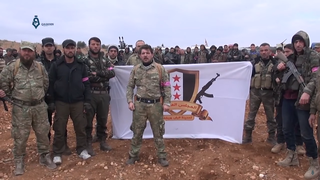
Turkey's involvement in the Syrian Civil War began diplomatically and later escalated militarily. Initially, Turkey condemned the Syrian government at the outbreak of civil unrest in Syria during the spring of 2011; the Turkish government's involvement gradually evolved into military assistance for the Free Syrian Army in July 2011, border clashes in 2012, and direct military interventions in 2016–17, in 2018, in 2019, 2020, and in 2022. The military operations have resulted in the Turkish occupation of northern Syria since August 2016.
In late July 2015, the third phase of the Kurdish–Turkish conflict between various Kurdish insurgent groups and the Turkish government erupted, following a failed two and a half year-long peace process aimed at resolving the long-running conflict.
Andrei Karlov, the Russian Ambassador to Turkey, was assassinated by Mevlüt Mert Altıntaş, an off-duty Turkish police officer, at an art exhibition in Ankara, Turkey on the evening of 19 December 2016. The assassination took place after several days of protests in Turkey over Russian involvement in the Syrian Civil War and the battle over Aleppo.

In March 2017, the Netherlands and Turkey were involved in a diplomatic incident, triggered by Turkish efforts to hold political rallies on Dutch territory and subsequent travel restrictions placed by Dutch authorities on Turkish officials seeking to promote the campaign for a 'yes' vote in the upcoming Turkish constitutional referendum to Turkish citizens living in the Netherlands. Such foreign campaigning is illegal under Turkish law.
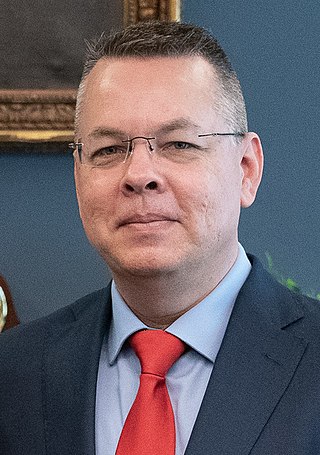
Andrew Craig Brunson is an American pastor and a teaching elder of the Evangelical Presbyterian Church. Brunson was an evangelical pastor of the Izmir Resurrection Church, a small Protestant church with about 24 congregants. German news service T-Online describes the church as having been held in a room in a tenement. Brunson was arrested in October 2016 in Turkey, where he had lived since the mid-1990s, for being associated with the Gülenist Terror Group (FETÖ) and the PKK as well as espionage, during the purges following the 2016 Turkish coup d'état attempt against the democratically elected government of Recep Tayyip Erdoğan. In 2019, Brunson published a memoir about his ordeal.

On December 6, 2017, the United States of America officially recognized Jerusalem as the capital city of the State of Israel. American president Donald Trump, who signed the presidential proclamation, also ordered the relocation of the American diplomatic mission to Jerusalem from Tel Aviv, constituting what is now the Embassy of the United States in Jerusalem, which was established on the grounds of the former Consulate General of the United States in Jerusalem. Israeli prime minister Benjamin Netanyahu welcomed the decision and praised the announcement by the Trump administration. On December 8, U.S. Secretary of State Rex Tillerson clarified that Trump's statement "did not indicate any final status for Jerusalem" and "was very clear that the final status, including the borders, would be left to the two parties to negotiate and decide" in reference to the recognition's impact on the Israeli–Palestinian peace process.
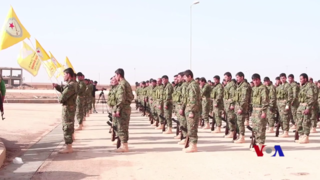
The Syrian Border Security Force (BSF) is a reported U.S.-trained border security force which is to deploy along Syria's borders with Turkey, Iraq and the Euphrates, with the strategic aim of containing remnants of the Islamic State of Iraq and the Levant (ISIL). The US state department recently denied the implementation of any border security force by the US government referring to the new development simply as security training.
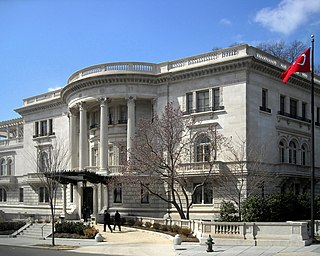
Edward Hamlin Everett House, is a 1915 Beaux-Arts mansion located, just off Sheridan Circle, at 1606 23rd St., NW in Washington, D.C. that today is the Residence of the Ambassador of Turkey.
This article overviews the 2010s in Middle Eastern political history














